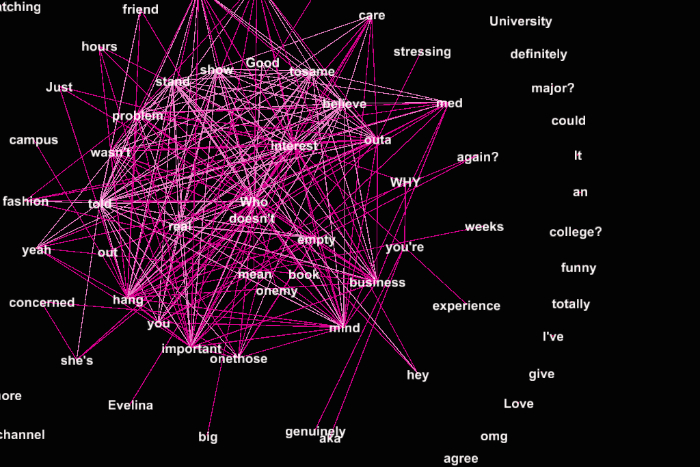
A few years ago Nick Szabo found himself in Korea after his wife was offered a job. He thought he would take a year off, but soon found himself in the fast-paced startup world of Asia.
In 2014 the team of seven behind St. Louis-based Swizzle started working on a company called Idea Above, which had a product called Swizzle.
“At the time Swizzle was actually a music video playlist curation app,” said Nick Szabo, COO, Swizzle. “It was an entertaining app where people could put together playlists, and their friends could add to them.”
Szabo said that the app generated attention from Southeast Asia, and soon the team started building relationships with big entertainment companies.
“To pay the bills we started doing outsourcing projects with these companies, and we started getting this reputation of being the people that could solve problems,” said Szabo. “The companies were really good at data, except for this huge chunk where they actually had to read and guess what their customers wanted.”
Szabo said that Swizzle helps take the guessing out of business solutions.
How Swizzle works
Swizzle uses artificial intelligence, natural language processing, text analytics and other systems to go through massive amounts of content.
“Basically we use technology to read,” said Szabo.
App developers that have too many comments coming in from app stores can now pinpoint specific issues or overall feedback on an app with Swizzle.
Szabo explained that once they were working for a gaming company and that the team was able to tell the company, not only that people were upset by certain features, but why they were upset and what problems were caused by that particular bug.
“We can take text and give you the sort of insights that a human would be able to give,” said Szabo. “It’s keyword analysis, sentiment analysis, tone analysis, going into topic modeling and having smart programs figure out trends, etc. It’s a really interesting world.”

Szabo explained that the team also offers deep dive analyses for businesses.
“That part is more human involved than you would think,” said Szabo. “We call it augmented intelligence, where the AI and the text analytics can pull various insights and display them in a variety of different ways.”
Szabo explained that the data strategist then goes through the collected data and dissect the information as if they were able to read through everything, and teaches the AI what it needs to know for that particular customer and how to find future trends like it.
Building relationships across Asia
The Swizzle team has been fundraising off and on all year.
“We’ve tested our technology and have slew of customers that say it works, so now we need money to build a SaaS version of our platform and to start expanding across Asia,” said Szabo. “We need to set up an office in Shanghai, Singapore and Tokyo, and we need to start hitting it aggressively.”
Szabo said that the team was originally raising money based on relationships.
“It was a very Asian style of business,” said Szabo. “We built everything by relationships, so the idea of approaching fundraising like sales never really occurred to us.”
Szabo said that building business relationships in Asia takes time and the confidence to go out and make solid connections. He also explained the difference between the mentality of growing globally versus growing nationally.
“There’s a mentality there that globalization is the only way to go,” said Szabo. “Where in the West we focus on selling to as many Americans as we can because America has such a big economy in and of itself.”
Szabo explained that the countries that these once third world countries in Asia built themselves up using high technology, innovation and globalization.
“There’s so much opportunity in Asia that the West doesn’t focus on,” said Szabo.
Different solutions for different customs
Korean linguistic customs versus American and European linguistic customs also make the technology behind Swizzle interesting to Szabo.
“When Koreans talk on YouTube it’s extraordinarily critical and negative which is completely different than how they talk in person,” said Szabo. “The way you use the internet directly affects how you interact with the internet, so just running text analytics doesn’t cut it. You have to pull in cultural understandings for every country you’re working in.”
Szabo said since the team had to build their platform in Korean and English at the same time, they were able to achieve much more valid data.
What’s next for Swizzle
Since its founding, Swizzle has received many awards including being in the top 100 startups from Red Herring Asia, BGlobal, E27 and Tech in Asia. The startup was also selected as one of the top 12 Asian companies to help IBM Watson help spearhead their expansion to Asia.
Szabo said that the startup also has some major clients including some Fortune 1000 and Fortune 500 companies.
When asked about the big vision for Swizzle, Szabo said they will be focusing on expanding across Asia.
“There’s just so much opportunity,” said Szabo. “So many people are getting online, it’s one of the fastest growing markets and these big companies don’t have a good way to listen to their feedback.”
—
Mel Lucks is a regional freelance journalist and former intern for Silicon Prairie News and AIM.




